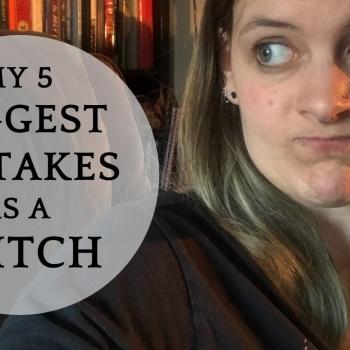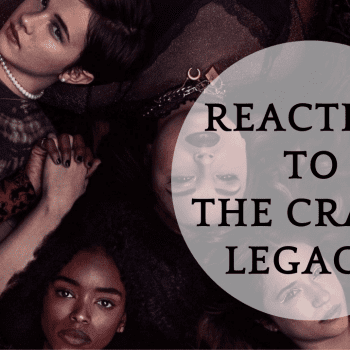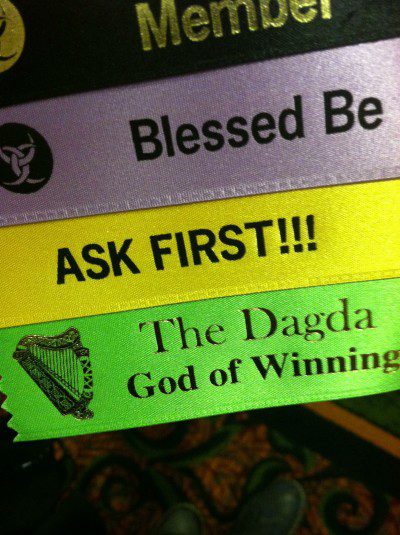
My first PantheaCon has come and gone, and I’m back at home nursing jet lag and trying to figure out how I’m going to get back on track with writing and running. Right now all I want to do is sleep and eat.
I’m not even sure where to begin.
I’ve been to a lot of Pagan events over the years, and PantheaCon isn’t like anything I’ve experienced in the past. For one thing, it’s indoors—you never have to leave the hotel. For another, it’s just freaking huge (I heard estimates from 1500 to 3000 attendees). I knew it would be different, so I tried to minimize my list of expectations beforehand, but I did go in with several goals:
1. Meet other Patheos bloggers.
Blogs don’t always reflect the people writing them with the greatest accuracy, because we all write for different reasons. Part of what we’re doing is trying to persuade other people to read our work, and that often entails a lot of self-censorship, especially when views potentially translate to cash and fame (though, admittedly, very little of either for most of the writers here). I wanted the opportunity to see who we all are in real life, when most of those filters come down. I’m proud to be able to say that everyone I spent time with was fantastic. I freely gave out my phone number, made hang-out plans, swapped personal stories, and mentally committed to Internet-stalking a bunch of blogs that I would normally have overlooked.
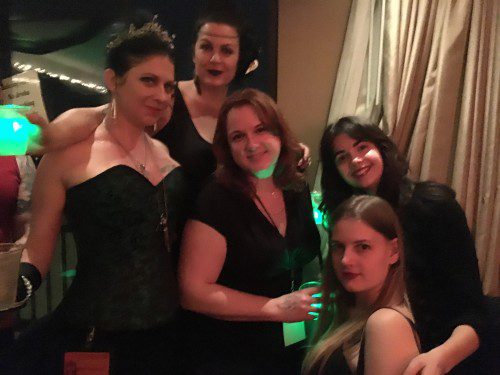
2. Be inspired to continue writing that book, and maybe talk to someone about publishing.
I’m a writer. Blogging is awesome, but I want to write books, too. I’ve had a number of longer projects in the works over the years, and lately that’s been coming to a head. I figured PantheaCn would be a good way to meet people who could pass along their experience and advice, and maybe even hook me up with supportive people within the industry. This was a remarkably easy task. Llewellyn and Weiser both had hospitality suites, and the folks at Llewellyn even offered a workshop just on this subject. I got to talk to people about the process first-hand, pitch an idea, swap some business cards, and leave actually feeling like writing.
3. Take awkward selfies with as many “Big Name Pagans” as possible.
This sounds stupid, but it was actually one of the best parts of the event. As a community, we have a really strange relationship with the concept of celebrity. We like to pretend that we don’t care about fame, and many of us pretty openly despise the whole “big name Pagan” thing, but that doesn’t stop us from hero-worshipping authors, speakers, and Internet stars. And because we’re such a small community, fame isn’t really out of reach for many of us. The right reblog, a viral YouTube video, or a snarky Twitter account are all potentially enough to start the ball rolling. It makes us collectively uncomfortable (as does everything about the marketplace, money, and consumerism, seemingly, though these are all important influences on Paganism as a whole), but I think a lot of that discomfort is feigned. Just look at our history. We love our celebrities, be they tradition spokespeople, authors, bloggers, or even people we just love to hate on.
But here’s the thing: no matter how you feel about your favorite author or the concept of the big name Pagan, all of these folks are just people. They have foibles, insecurities, layered personalities, and (it turns out) favorite cocktails. These folks are hanging out and learning from each other, just like everyone else there. The fact that they’re willing to take stupid pictures with me serves as a reminder that popularity doesn’t preclude relatability. If fame makes you a jerk (and there are some jerks out there, let’s be real) there’s a fair chance you were already at least halfway there beforehand.
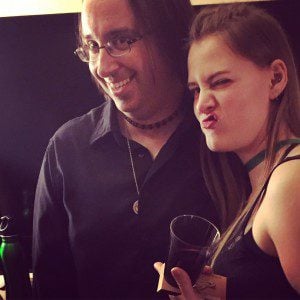
4. Meet my Internet friends and pen pals.
This was my favorite part, I think. It’s easy to make jokes about the dichotomy between the Internet and “real life,” but the Internet is real life. It’s not all of it, sure, but how significant it is really varies from person to person. We often forget that the people we interact with online are people. And my relationships with people online are just as important as many of my physical relationships. We talk to each other, care about each other, laugh, share our lives, and often keep better tabs on each other than we do our extended (or even immediate) families. For some Pagans, these Internet relationships might be the only support they have in their assorted paths.
I’ve been on YouTube for almost five years. Now I’m on Patheos. Before all of that, it was Livejournal. Some of my Internet relationships have lasted longer than many of my in-person friendships, so getting to actually hug and have drinks with these people can be a big deal.
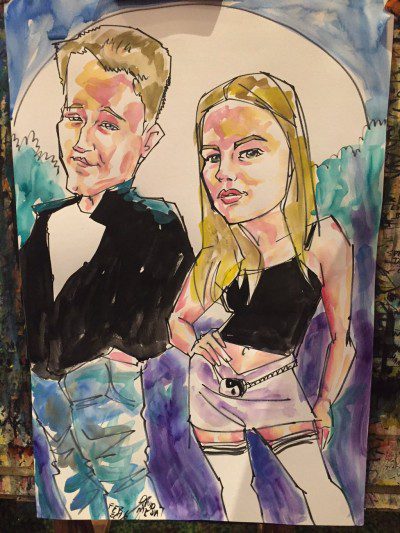
PantheaCon went well beyond any of these expectations. It’s been a long time since I’ve been able to cut loose and just have a good time. I couldn’t tell you the last time I went to a party, and the Green Fairy Room had me grinning like an idiot for hours.
I met so many amazing people, many of whom I got to know through late night conversations in strange hotel rooms, way after workshops and rituals had ended.
I also left more determined than ever to finish that project on Paganism and regionalism, because holy shit California is weird. I’m a Southern transplant, but I’ve never felt so Southern in my life (can I be Southern after ten years in North Carolina? I don’t even know). In academic treatments of Paganism, it seems like a lot of focus lands on California, and the Bay in particular. But that’s only a tiny part of the story, though you might not know that from reading history books. And witchcraft in particular—whether we think of ourselves as nature religion or not—seems to be inherently impacted by region. It’s flavored. And I didn’t quite taste my flavor at PantheaCon, where most everyone I met was from the west coast. Part of it is political (I’m not sure you can ever really separate that from religion—we’re always informed by what we value). Part of it is economic (religion looks different when it’s practiced by wealthy people versus poor people). And part of it is just cultural (which includes most everything else I can think of).
I can’t quite put my finger on it, but there’s something significant there.
To be clear, this isn’t a complaint. I never felt excluded or alienated. I just came to see my own differences more clearly, and appreciate them for maybe the first time.
I’ll definitely try to go back, funds allowing. Maybe I’ll even pitch a workshop idea or two. But even if PantheaCon turns out to be an impossibility, I hope I’ll at least be able to fly out and visit my new friends.







